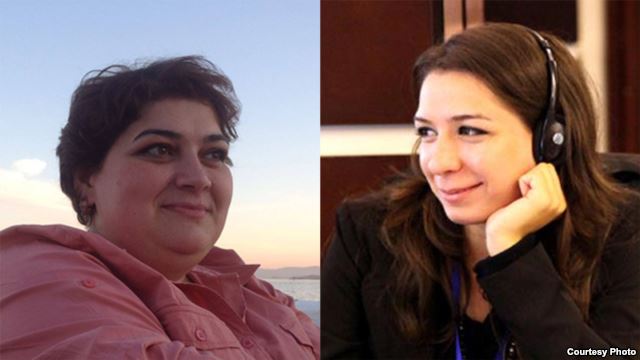RFE/RL Azeri Journalists Win Global Investigative Reporting Award

RFE/RL Azerbaijani Service correspondents Khadija Ismayilova and Nushabe Fatullayeva, along with journalists Pavla Holcova and Jaromir Hason, have won a 2013 Global Shining Light Award for their work in exposing “questionable business dealings” involving the family of Azerbaijani President Ilham Aliyev. The award was presented at an October 14 ceremony in Rio De Janeiro, Brazil.
In a collaboration involving RFE/RL, the Organized Crime and Corruption Reporting Project, and the Czech Center for Investigative Journalism, the team of reporters discovered that members of Azerbaijan’s first family hold sizable stakes in a new gold and silver mine that has blocked villagers’ access to land and water.
Soon after the report was published, Ismayilova, a freelancer for Radio Azadliq, as the Azerbaijani Service is known locally, received an anonymous blackmail threat warning her to “behave” or face being defamed in her conservative home country. Far from giving in to the blackmail, Ismayilova “exhibited rare bravery,” according to the judges, by publicizing the threat and continuing her efforts to uncover fraud and corruption.
“This is great recognition of our work. We have invested a lot in these reports, and suffered a lot,” said Azerbaijani Service Director Kenan Aliyev. “But we will continue to cover these issues because they are of public importance to the people of Azerbaijan.”
The Global Shining Light Award, which was presented for the fifth time during the 2013 Global Investigative Journalism Conference in Rio de Janeiro, “honors investigative journalism conducted in a developing or transitioning country, done under threat, duress, or in the direst of conditions.” Ismayilova, Fatullayeva, Holcova, and Hason are sharing the award with three reporters with the South African newspaper “Sunday Times,” who were recognized for their report “Cato Manor: Inside a South African Police Death Squad.”
RFE/RL’s Azerbaijani Service has been banned from Azerbaijan’s domestic airwaves since the beginning of 2009. In spite of the ban, Radio Azadliq continues to reach its audiences in Azerbaijan via satellite transmissions, the Internet, and social media, providing them with unparalleled coverage of major events such as Azerbaijan’s recent controversial presidential election and the detention of an Azeri national as a suspect in the murder that recently sparked violent clashes between anti-migrant protesters and police in Moscow.
